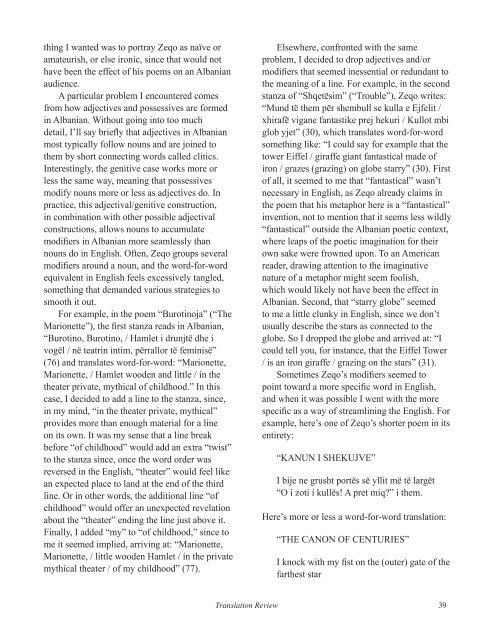Table of contents - The University of Texas at Dallas
Table of contents - The University of Texas at Dallas
Table of contents - The University of Texas at Dallas
You also want an ePaper? Increase the reach of your titles
YUMPU automatically turns print PDFs into web optimized ePapers that Google loves.
thing I wanted was to portray Zeqo as naïve or<br />
am<strong>at</strong>eurish, or else ironic, since th<strong>at</strong> would not<br />
have been the effect <strong>of</strong> his poems on an Albanian<br />
audience.<br />
A particular problem I encountered comes<br />
from how adjectives and possessives are formed<br />
in Albanian. Without going into too much<br />
detail, I’ll say briefly th<strong>at</strong> adjectives in Albanian<br />
most typically follow nouns and are joined to<br />
them by short connecting words called clitics.<br />
Interestingly, the genitive case works more or<br />
less the same way, meaning th<strong>at</strong> possessives<br />
modify nouns more or less as adjectives do. In<br />
practice, this adjectival/genitive construction,<br />
in combin<strong>at</strong>ion with other possible adjectival<br />
constructions, allows nouns to accumul<strong>at</strong>e<br />
modifiers in Albanian more seamlessly than<br />
nouns do in English. Often, Zeqo groups several<br />
modifiers around a noun, and the word-for-word<br />
equivalent in English feels excessively tangled,<br />
something th<strong>at</strong> demanded various str<strong>at</strong>egies to<br />
smooth it out.<br />
For example, in the poem “Burotinoja” (“<strong>The</strong><br />
Marionette”), the first stanza reads in Albanian,<br />
“Burotino, Burotino, / Hamlet i drunjtë dhe i<br />
vogël / në te<strong>at</strong>rin intim, përrallor të feminisë”<br />
(76) and transl<strong>at</strong>es word-for-word: “Marionette,<br />
Marionette, / Hamlet wooden and little / in the<br />
the<strong>at</strong>er priv<strong>at</strong>e, mythical <strong>of</strong> childhood.” In this<br />
case, I decided to add a line to the stanza, since,<br />
in my mind, “in the the<strong>at</strong>er priv<strong>at</strong>e, mythical”<br />
provides more than enough m<strong>at</strong>erial for a line<br />
on its own. It was my sense th<strong>at</strong> a line break<br />
before “<strong>of</strong> childhood” would add an extra “twist”<br />
to the stanza since, once the word order was<br />
reversed in the English, “the<strong>at</strong>er” would feel like<br />
an expected place to land <strong>at</strong> the end <strong>of</strong> the third<br />
line. Or in other words, the additional line “<strong>of</strong><br />
childhood” would <strong>of</strong>fer an unexpected revel<strong>at</strong>ion<br />
about the “the<strong>at</strong>er” ending the line just above it.<br />
Finally, I added “my” to “<strong>of</strong> childhood,” since to<br />
me it seemed implied, arriving <strong>at</strong>: “Marionette,<br />
Marionette, / little wooden Hamlet / in the priv<strong>at</strong>e<br />
mythical the<strong>at</strong>er / <strong>of</strong> my childhood” (77).<br />
Elsewhere, confronted with the same<br />
problem, I decided to drop adjectives and/or<br />
modifiers th<strong>at</strong> seemed inessential or redundant to<br />
the meaning <strong>of</strong> a line. For example, in the second<br />
stanza <strong>of</strong> “Shqetësim” (“Trouble”), Zeqo writes:<br />
“Mund të them për shembull se kulla e Ejfelit /<br />
xhirafë vigane fantastike prej hekuri / Kullot mbi<br />
glob yjet” (30), which transl<strong>at</strong>es word-for-word<br />
something like: “I could say for example th<strong>at</strong> the<br />
tower Eiffel / giraffe giant fantastical made <strong>of</strong><br />
iron / grazes (grazing) on globe starry” (30). First<br />
<strong>of</strong> all, it seemed to me th<strong>at</strong> “fantastical” wasn’t<br />
necessary in English, as Zeqo already claims in<br />
the poem th<strong>at</strong> his metaphor here is a “fantastical”<br />
invention, not to mention th<strong>at</strong> it seems less wildly<br />
“fantastical” outside the Albanian poetic context,<br />
where leaps <strong>of</strong> the poetic imagin<strong>at</strong>ion for their<br />
own sake were frowned upon. To an American<br />
reader, drawing <strong>at</strong>tention to the imagin<strong>at</strong>ive<br />
n<strong>at</strong>ure <strong>of</strong> a metaphor might seem foolish,<br />
which would likely not have been the effect in<br />
Albanian. Second, th<strong>at</strong> “starry globe” seemed<br />
to me a little clunky in English, since we don’t<br />
usually describe the stars as connected to the<br />
globe. So I dropped the globe and arrived <strong>at</strong>: “I<br />
could tell you, for instance, th<strong>at</strong> the Eiffel Tower<br />
/ is an iron giraffe / grazing on the stars” (31).<br />
Sometimes Zeqo’s modifiers seemed to<br />
point toward a more specific word in English,<br />
and when it was possible I went with the more<br />
specific as a way <strong>of</strong> streamlining the English. For<br />
example, here’s one <strong>of</strong> Zeqo’s shorter poem in its<br />
entirety:<br />
“KANUN I SHEKUJVE”<br />
I bije ne grusht portës së yllit më të largët<br />
“O i zoti i kullës! A pret miq” i them.<br />
Here’s more or less a word-for-word transl<strong>at</strong>ion:<br />
“THE CANON OF CENTURIES”<br />
I knock with my fist on the (outer) g<strong>at</strong>e <strong>of</strong> the<br />
farthest star<br />
Transl<strong>at</strong>ion Review 39

















